如何选择定语从句的引导词_非常有用!
英语定语从句的引导词与构成
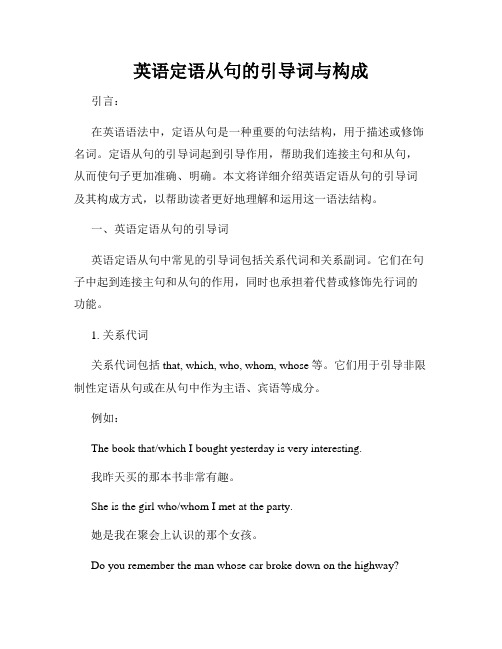
英语定语从句的引导词与构成引言:在英语语法中,定语从句是一种重要的句法结构,用于描述或修饰名词。
定语从句的引导词起到引导作用,帮助我们连接主句和从句,从而使句子更加准确、明确。
本文将详细介绍英语定语从句的引导词及其构成方式,以帮助读者更好地理解和运用这一语法结构。
一、英语定语从句的引导词英语定语从句中常见的引导词包括关系代词和关系副词。
它们在句子中起到连接主句和从句的作用,同时也承担着代替或修饰先行词的功能。
1. 关系代词关系代词包括that, which, who, whom, whose等。
它们用于引导非限制性定语从句或在从句中作为主语、宾语等成分。
例如:The book that/which I bought yesterday is very interesting.我昨天买的那本书非常有趣。
She is the girl who/whom I met at the party.她是我在聚会上认识的那个女孩。
Do you remember the man whose car broke down on the highway?你还记得那个车在高速公路上抛锚的男人吗?2. 关系副词关系副词包括where, when, why等。
它们用于引导定语从句,在从句中作状语或修饰先行词。
例如:This is the house where I was born.这是我出生的那所房子。
He can't forget the day when he won the championship.他无法忘记他赢得冠军的那一天。
I don't know the reason why he didn't come to the party.我不知道他没有来参加派对的原因。
二、英语定语从句的构成方式英语定语从句的构成方式主要有两种:限制性定语从句和非限制性定语从句。
1. 限制性定语从句限制性定语从句用于对先行词进行限定或定义,它们是句子的重要组成部分,删除后会导致句子意义不完整。
定语从句的引导词和结构
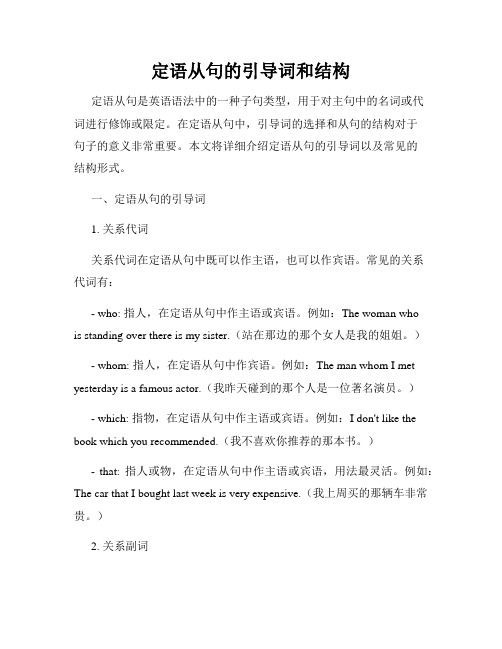
定语从句的引导词和结构定语从句是英语语法中的一种子句类型,用于对主句中的名词或代词进行修饰或限定。
在定语从句中,引导词的选择和从句的结构对于句子的意义非常重要。
本文将详细介绍定语从句的引导词以及常见的结构形式。
一、定语从句的引导词1. 关系代词关系代词在定语从句中既可以作主语,也可以作宾语。
常见的关系代词有:- who: 指人,在定语从句中作主语或宾语。
例如:The woman whois standing over there is my sister.(站在那边的那个女人是我的姐姐。
)- whom: 指人,在定语从句中作宾语。
例如:The man whom I met yesterday is a famous actor.(我昨天碰到的那个人是一位著名演员。
)- which: 指物,在定语从句中作主语或宾语。
例如:I don't like the book which you recommended.(我不喜欢你推荐的那本书。
)- that: 指人或物,在定语从句中作主语或宾语,用法最灵活。
例如:The car that I bought last week is very expensive.(我上周买的那辆车非常贵。
)2. 关系副词关系副词在定语从句中一般作状语,修饰整个句子。
常见的关系副词有:- when: 指时间,在定语从句中作时间状语。
例如:I still remember the day when we first met.(我仍然记得我们第一次见面的那天。
)- where: 指地点,在定语从句中作地点状语。
例如:This is the school where I studied.(这是我曾经就读的那所学校。
)- why: 指原因,在定语从句中作原因状语。
例如:I don't know the reason why he left.(我不知道他离开的原因。
)二、定语从句的结构1. 非限制性定语从句非限制性定语从句用于对主句中的名词或代词进行额外的说明,意义上是添加的内容,并不改变主句的意思,因此非限制性定语从句一般用逗号与主句隔开。
怎样快速选准定语从句的引导词

怎样快速选准定语从句的引导词定语从句关系词的选择对初学者来说确实很棘手,但只要掌握了选择是诀窍,就迎刃而解了。
要想快速准确地掌握定语从句关系词的选择,首先要了解和掌握关系词的分类和各个关系词的具体用法。
见下表:●选择诀窍:因为关系词实质上就是代替先行词的词,因此关系词的选择依据是先行词(被定语从句所修饰的词),即根据先行词①指人、指物,还是表地点、时间、原因;②逻辑上在定语从句中作何成分。
2个条件必须同时满足才能确定一个具体的相应关系词。
见下表:①指人、指物,还是表地点、时间、原因先行词关系词②逻辑上在定语从句中作何成分例:1)Who’s the man ( whom/that ) we saw just now?解释:先行词the man①指人,②逻辑上作定语从句we saw just now的宾语。
选关系词应该选一个能代替该先行词的关系词:指人、作宾语,因此可选关系代词whom或that。
2)The man who/that works in the office is a math teacher?解释:先行词the man①指人,②逻辑上作定语从句works in the office的主语,因此可选关系代词who或that(代替the man)。
3)Mary is the student whose handwriting is the best in our class.解释:先行词the student①指人,②逻辑上只可能作定语从句中handwriting的定语,因此可选关系代词whose(代替the student’s)。
4)The desk whose leg is broken is Jim’s desk.解释:先行词the desk①指物,②逻辑上只可能作leg的定语,因此可选关系代词whose(与之匹配)。
5)This is the student whose bike Tom borrowed.、比较:This is the student whom/that Tom borrowed the bike from.解释:在第一个句子中,先行词the student指人,逻辑上作定语从句中bike的定语,因此选用关系代词whose。
定语从句的引导词 如何确定
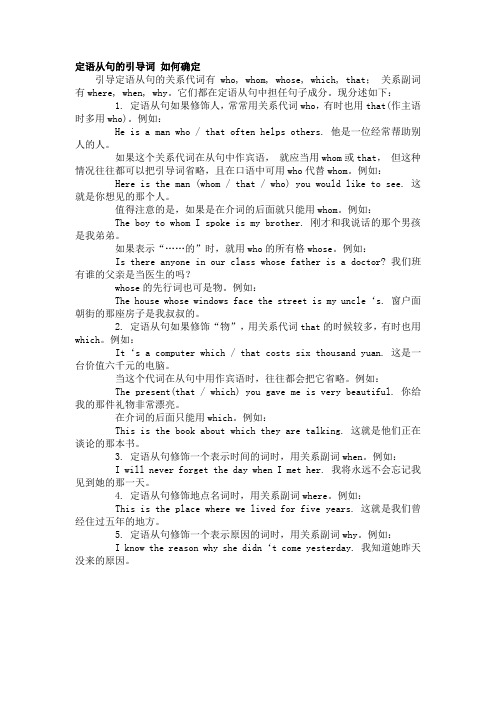
定语从句的引导词如何确定引导定语从句的关系代词有who, whom, whose, which, that;关系副词有where, when, why。
它们都在定语从句中担任句子成分。
现分述如下:1. 定语从句如果修饰人,常常用关系代词who,有时也用that(作主语时多用who)。
例如:He is a man who / that often helps others. 他是一位经常帮助别人的人。
如果这个关系代词在从句中作宾语,就应当用whom或that,但这种情况往往都可以把引导词省略,且在口语中可用who代替whom。
例如:Here is the man (whom / that / who) you would like to see. 这就是你想见的那个人。
值得注意的是,如果是在介词的后面就只能用whom。
例如:The boy to whom I spoke is my brother. 刚才和我说话的那个男孩是我弟弟。
如果表示“……的”时,就用who的所有格whose。
例如:Is there anyone in our class whose father is a doctor? 我们班有谁的父亲是当医生的吗?whose的先行词也可是物。
例如:The house whose windows face the street is my uncle‘s. 窗户面朝街的那座房子是我叔叔的。
2. 定语从句如果修饰“物”,用关系代词that的时候较多,有时也用which。
例如:It‘s a computer which / that costs six thousand y uan. 这是一台价值六千元的电脑。
当这个代词在从句中用作宾语时,往往都会把它省略。
例如:The present(that / which) you gave me is very beautiful. 你给我的那件礼物非常漂亮。
高中语法突破定语从句引导词的选择与辨析
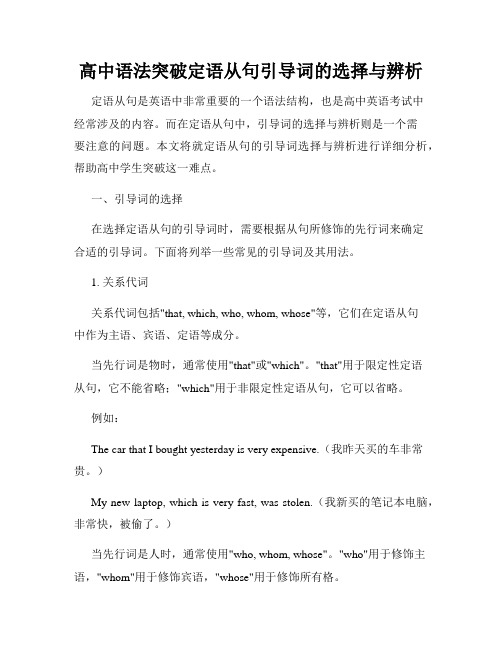
高中语法突破定语从句引导词的选择与辨析定语从句是英语中非常重要的一个语法结构,也是高中英语考试中经常涉及的内容。
而在定语从句中,引导词的选择与辨析则是一个需要注意的问题。
本文将就定语从句的引导词选择与辨析进行详细分析,帮助高中学生突破这一难点。
一、引导词的选择在选择定语从句的引导词时,需要根据从句所修饰的先行词来确定合适的引导词。
下面将列举一些常见的引导词及其用法。
1. 关系代词关系代词包括"that, which, who, whom, whose"等,它们在定语从句中作为主语、宾语、定语等成分。
当先行词是物时,通常使用"that"或"which"。
"that"用于限定性定语从句,它不能省略;"which"用于非限定性定语从句,它可以省略。
例如:The car that I bought yesterday is very expensive.(我昨天买的车非常贵。
)My new laptop, which is very fast, was stolen.(我新买的笔记本电脑,非常快,被偷了。
)当先行词是人时,通常使用"who, whom, whose"。
"who"用于修饰主语,"whom"用于修饰宾语,"whose"用于修饰所有格。
例如:The girl who is laughing is my sister.(笑的那个女孩是我妹妹。
)The man whom I met yesterday is a doctor.(我昨天遇到的那个男人是个医生。
)The doctor whose car was stolen called the police.(被偷车的医生报警了。
)2. 关系副词关系副词包括"when, where, why"等,它们在定语从句中用来修饰时间、地点和原因。
定语从句的引导词及用法总结
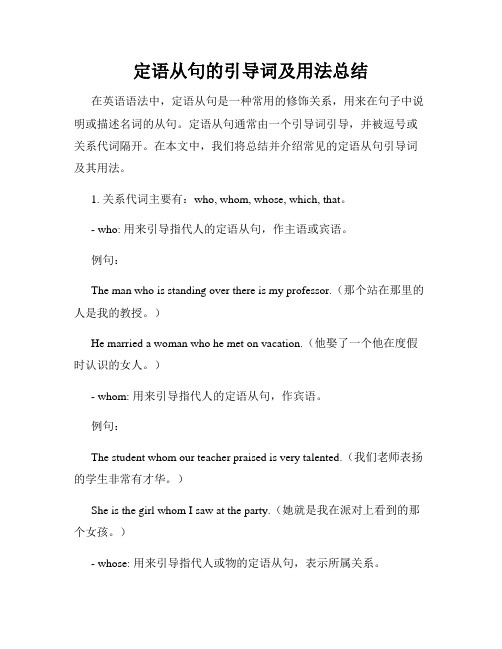
定语从句的引导词及用法总结在英语语法中,定语从句是一种常用的修饰关系,用来在句子中说明或描述名词的从句。
定语从句通常由一个引导词引导,并被逗号或关系代词隔开。
在本文中,我们将总结并介绍常见的定语从句引导词及其用法。
1. 关系代词主要有:who, whom, whose, which, that。
- who: 用来引导指代人的定语从句,作主语或宾语。
例句:The man who is standing over there is my professor.(那个站在那里的人是我的教授。
)He married a woman who he met on vacation.(他娶了一个他在度假时认识的女人。
)- whom: 用来引导指代人的定语从句,作宾语。
例句:The student whom our teacher praised is very talented.(我们老师表扬的学生非常有才华。
)She is the girl whom I saw at the party.(她就是我在派对上看到的那个女孩。
)- whose: 用来引导指代人或物的定语从句,表示所属关系。
例句:The book whose cover is red is mine.(那本封面是红色的书是我的。
)The boy whose father is a doctor wants to become a doctor too.(那个父亲是医生的男孩也想成为医生。
)- which: 用来引导指代物的定语从句,作主语或宾语。
例句:The car which is parked in front of the house belongs to him.(停在房子前面的那辆车是他的。
)I borrowed a pen which writes very smoothly.(我借了一支写起来很顺畅的笔。
)- that: 用来引导指代人或物的定语从句,作主语或宾语。
定语从句引导词选择

定语从句引导词选择在汉语语法中,定语从句是一种由引导词引导的修饰性从句,用来给主句中的名词或代词添加进一步的限定或说明。
定语从句引导词的选择非常重要,不同的引导词在句子中起到不同的作用。
下面将介绍常见的定语从句引导词并探讨其使用时的注意事项。
一、关系代词的选择1. 作主语或宾语时:(1)主语:关系代词“who”(指人)或“that”(指人或物)。
(2)宾语:关系代词“whom”(指人)或“that”(指人或物)。
在非正式口语中,也可以使用“who”代替“whom”。
2. 作介词宾语时:关系代词“whom”(指人)或“which”(指物)。
3. 作表语时:关系代词“who”(指人)或“which”(指物)。
4. 作定语时:(1)指人:关系代词“whose”(所有格形式),例如:“The man whose car was stolen reported it to the police.”(那个被偷车的人向警察报案了。
)(2)指物:关系代词“whose”(所有格形式)、“which”或“that”,例如:“This is the book whose cover is torn.”(这本书封面被撕破了。
)二、关系副词的选择1. 地点:关系副词“where”,例如:“I still remember the place where we met for the first time.”(我还记得我们第一次见面的地方。
)2. 时间:关系副词“when”,例如:“Do you remember the day whenwe went to the beach together?”(你还记得我们一起去海滩的那一天吗?)3. 原因:关系副词“why”,例如:“He didn't tell me the reason why he was angry.”(他没有告诉我他生气的原因。
)三、注意事项1. 避免重复:在定语从句中,关系代词或关系副词所代表的成分应该与先行词在性、数、人称等方面保持一致,并避免重复使用。
定语从句的引导词及关系代词的使用
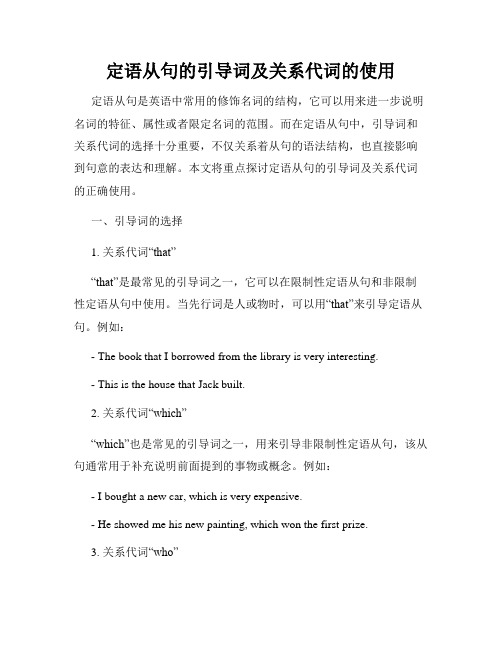
定语从句的引导词及关系代词的使用定语从句是英语中常用的修饰名词的结构,它可以用来进一步说明名词的特征、属性或者限定名词的范围。
而在定语从句中,引导词和关系代词的选择十分重要,不仅关系着从句的语法结构,也直接影响到句意的表达和理解。
本文将重点探讨定语从句的引导词及关系代词的正确使用。
一、引导词的选择1. 关系代词“that”“that”是最常见的引导词之一,它可以在限制性定语从句和非限制性定语从句中使用。
当先行词是人或物时,可以用“that”来引导定语从句。
例如:- The book that I borrowed from the library is very interesting.- This is the house that Jack built.2. 关系代词“which”“which”也是常见的引导词之一,用来引导非限制性定语从句,该从句通常用于补充说明前面提到的事物或概念。
例如:- I bought a new car, which is very expensive.- He showed me his new painting, which won the first prize.3. 关系代词“who”“who”用来引导限制性定语从句,修饰先行词是人的名词。
例如:- The man who is sitting over there is my uncle.- She is the teacher who taught me English last year.4. 关系代词“whom”“whom”也用来引导限制性定语从句,但它在从句中作宾语,修饰先行词是人的名词。
例如:- The girl whom I met yesterday is a famous singer.- Do you know the woman whom he is dating?5. 关系代词“whose”“whose”是一个特殊的关系代词,用来表示所属关系。
- 1、下载文档前请自行甄别文档内容的完整性,平台不提供额外的编辑、内容补充、找答案等附加服务。
- 2、"仅部分预览"的文档,不可在线预览部分如存在完整性等问题,可反馈申请退款(可完整预览的文档不适用该条件!)。
- 3、如文档侵犯您的权益,请联系客服反馈,我们会尽快为您处理(人工客服工作时间:9:00-18:30)。
如何选择定语从句的引导词?*限制性定语从句限制性定语从句修饰先行词,对先行词起修饰作用,紧接先行词之后,无逗号,若省去,原句意思不完整。
引导定语从句的关系代词有who,whom,whose,which,that等。
who,whom,whose用于指人,whose有时也可指物,相当于of which;which用于指物;that 既可指人也可指物,但只用于限制性定语从句中。
关系代词除了引导定语从句,替代先行词外,还在从句中担任主语、宾语、定语等。
*非限制性定语从句非限制性定语从句既可修饰先行词,也可修饰整个主句,起补充说明作用,与主句之间有逗号隔开,若省去,原句意思不受影响。
不可用that引导非限制性定语从句。
关系词不可省略。
一、定语从句的引导词有关系代词who,whom,whose,which,that,as;关系副词when,where,why。
定语从句中引导词的选用主要看先行词在定语从句中作什么成分或者是定语从句中缺什么成分。
1.定语从句中缺主语,修饰人时用who /that,修饰物时用which /that引导。
如:Is this the factory which /that makes TV sets?The man who /that visited our school is from Australia.2.从句中缺宾语,修饰人时用who /whom /that或省略引导词;修饰物时用which /that或省略引导词。
如:Gone are the days which /that we spent together in the village.He is the man who /whom /that I think to be worthy of our praise.3.从句中缺时间状语,用when或介词+which引导。
如:The day finally came when /on which I was given a job.We'll put off the outing until next week,when we won't be so busy.4.从句中缺地点状语,用where或介词+which引导。
如:Please put the letter on the desk where /on which he can easily find it.5.从句中缺原因状语或先行词是reason时,引导词用why /for which /that。
如:This is the reason why /for which /that he didn't come to the meeting.6.从句中缺定语,人和物都用whose引导。
如:A child whose parents are dead is called an orphan.Please pass me the dictionary whose cover is black.7.当先行词是way时,其定语从句的引导词用in which /that。
如:The way in which /that he looks at problems is wrong.二、引导词as可引导限制性定语从句,也可引导非限制性定语从句。
1.在固定词组the same...as,such...as中,as引导限制性定语从句。
如:He is not such a fool as he looks.I've bought the same dress as she is wearing.2.当先行词是整个主句时,可用as /which引导非限制性定语从句。
引导词as和which 的区别在于:①as引导的非限制性定语从句可放于主句前、主句中、主句后,而which引导的非限制性定语从句一般放于主句后或句中。
②as常与从句中的know,see,hear,expect等动词连用,也常用于as often happens,as is often the case(常有的事)等句子中;而which一般不用于以上情况。
③as有“正如”的含义,which没有此含义。
如:As is well known,Shanghai is a big city.Some of the roads were flooded,which made our journey more difficult.三、关系代词who,whom,whose,which和as能引导非限制性定语从句,而that不能;非限制性定语从句中即使缺宾语,引导词也不能省略;关系副词when,where能引导非限制性定语从句,而why不能。
如:Abraham Lincoln,who led the United States through the Civil War years,was shot on April 14,1865.四、先行词是物时,其引导词可用which也可用that,通常情况下二者可互换,但在有些情况下不能。
1.用which不用that引导定语从句的三种情况:①非限制性定语从句用which,不用that引导。
如:Football,which is a very interesting game,is played all over the world.②先行词为that时,为了避免重复,定语从句用which不用that引导。
如:That which you borrowed from me wasn't a real diamond necklace.③介词后用which不用that引导。
如:The method with which you solved the problem is very good.2.用that不用which的七种情况:①先行词前有形容词最高级或序数词修饰时,用that不用which引导。
如:This is the best place that I have ever visited.The second question that is asked is why we don't fall off the earth.②先行词为little,much,all,none,few,(the)one,something,everything,nothing,anything等不定代词时,用that引导。
如:There is nothing in the world that can frighten him.③先行词既有指人的名词又有指物的名词时,用that引导。
如:He told us about the people and the cities that he had visited.④先行词前有any,all,no,few,every,some,little,much,(the)very,(the)only,(the)last等词修饰时,用that引导。
如:This is the very coat that I need.Is oxygen the only gas that helps fire burn?⑤先行词为which时,为了避免重复,用that引导。
如:Which is the book that you bought yesterday?⑥先行词在从句中作表语时,常用that引导。
如:Shanghai is no longer the city that it used to be in the 1930's.⑦当主句是There be...句型时,用that引导。
There are two tickets for the film that are for you two.五、在“one of+复数名词+定语从句”结构中,从句的谓语动词应与复数名词保持一致;当one前有the only修饰时,从句的谓语动词应与the only one保持一致。
如:He was one of the students who were late for class.He was the only one of the students who was late for class.六、引导词前有介词或短语介词时,修饰人只能用whom,修饰物只能用which引导。
如:My glasses,without which I was like a blind man,fell to the ground and broke.The man,by whom the wolf was shot,is called Jackson.1. who(主格)先行词指人,在定语从句中作主语。
Whom(宾语)先行词指人,定语从句中作宾语。
例句:Is he the man who wants to see you?He is the man (whom)I saw in the reading room yesterday。
(whom作宾语时可省略)2. whose 先行词指人或指物,且只作定语,若指物,可与of which互换。
例句:That is a book whose cover(of which the cover)is red。
3. which 先行词指物,在从句中可作主语,宾语。
例句:The bag which is on the desk is mine.4. that 几乎是万能胶……能代替上述3个引导词,可做主语,宾语。
在此不再举例.that的特殊用法:A There be句型中用that不用whichB 在不定代词(something,anything,all,few,any等)后用that,不用which(something后也可用which)C 先行词有all,every,some,any,only,few或序数词,形容词最高级修饰时,只用thatD 先行词既指人又指物时,用thatE 先行词被the only,the very,the last修饰时,用thatF 避免关联词重复,用thatG 用作关系副词,修饰表示时间的名词(day ,time ,moment……)that可替代when5.when,where,why的先行词是指时间地点和理由的名词,先行词在从句中做状语.能与介词+ which互换.54. The Beatles, __________ many of you are old enough to remember, came from Liverpool. (2006天津卷)A. whatB. thatC. howD. as55. The owner of the cinema needed to make a lot of improvements and employ more people to keep it running, __________ meant spending tens of thousands of pounds. (2006江苏卷)A. whoB. thatC. asD. which56. Women __________ drink more than two cups of coffee a day have a greater chance of having heart disease than those __________ don’t. (2006北京卷)A. who; 不填B. 不填; whoC. who; whoD. 不填; 不填57. Look out! Don’t get too close to the house __________ roof is under repair. (2006福建卷)A. whoseB. whichC. of whichD. what58. We saw several natives advancing towards our party, and one of them came up to us, __________ we gave some bells and glasses. (2006湖南卷)A. to whichB. to whomC. with whomD. with which59. I was told that there were about 50 foreign students __________ Chinese in the school, most __________were from Germany. (2006辽宁卷)A. study; of whomB. study; of themC. studying; of themD. studying; of whom60. We’re just trying to reach a point __________ both sides will sit down together and talk. (2006山东卷)A. whereB. thatC. whenD. which61. She was educated at Beijing University, __________ she went on to have her advanced study abroad. (2006陕西卷)A. after whichB. from whichC. from thatD. after that62. I was given three books on cooking, the first __________ I really enjoyed. (2006浙江卷)A. of thatB. of whichC. thatD. which63. I saw a woman running toward me in the dark. Before I could recognize who she was, she had run back in the direction __________ she had come. (2006重庆卷)A. of whichB. by whichC. in whichD. from which64. You can find whatever you need at the shopping centre, __________ is always busy at the weekend. (2006上海卷)A. thatB. whereC. whatD. which65. Do you have anything to say for yourselves?—Yes, there’s one point __________ we must insist on. (2006江西卷)A. whyB. whereC. howD. /66. Last week, only two people came to look at the house, __________ wanted to buy it. (2007安徽卷)A. none of themB. both of themC. none of whomD. neither of whom67. We shouldn’t spent our money testing so many people, most of __________ are healthy. (2007北京卷)A. thatB. whichC. whatD. whom68. The village has developed a lot __________ we learned farming two years ago. (2007福建卷)A. whenB. whichC. thatD. where69. By serving others, a person focuses on someone other than himself or herself,__________ can be very eye-opening and rewarding. (2007湖南卷)A. whoB. whichC. whatD. that70. He was educated at the local high school, __________ he went on to Beijing University. (2007江苏卷)A. after whichB. after thatC. in whichD. in that71. After graduation she reached a point in her career __________ she had to decide what to do. (2007江西卷)A. thatB. whatC. whichD. where72. Some pre-school children go to a day-care center, __________ they learn simple games and songs. (2007全国I)A. thenB. thereC. whileD. where73. —Where did you get to know her?—It was on the farm __________ we worked. (2007山东卷)A. thatB. thereC. whichD. where74. The book was written in 1946, __________ the education system has witnessed great charges. (2007山东卷)A. whenB. during whichC. since thenD. since when75. Today, we’ll discuss a number of cases __________ beginners of English fail to use the language properly. (2007陕西卷)A. whichB. asC. whyD. where76. It is reported that two schools, __________ are being built in my hometown, will open next year. (2007四川卷)A. they bothB. which bothC. both of themD. both of which77. Those successful deaf dancers think that dancing is an activity __________ sight matters more than hearing. (2007天津卷)A. whenB. whoseC. whichD. where78. Chan’s restaurant on Baker Street, __________ used to be poorly run, is now a successful business. (2007浙江卷)A. thatB. whichC. whoD. where79. Human facial expressions differ from those of animals in the degree __________ they can be controlled on purpose. (2007重庆卷)A. with whichB. to whichC. of whichD. for which【答案与详解】1—53 (略)54. D。
